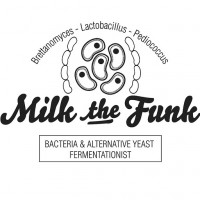Fermentables
|
Amount
|
Fermentable
|
Cost
|
PPG
|
°L |
Bill %
|
|
6.60 lb |
Pilsner (DE)6.6 lb Pilsner (DE) |
|
37.7 |
1 |
70.2% |
|
2.80 lb |
Unmalted Spelt2.8 lb Unmalted Spelt |
|
29.8 |
5 |
29.8% |
|
9.40 lbs / $ 0.00
|
Hops
|
Amount
|
Variety
|
Cost
|
Type
|
AA
|
Use
|
Time
|
IBU
|
Bill %
|
|
1.15 oz |
East Kent Golding (UK)1.15 oz East Kent Golding (UK) Hops |
|
Pellet |
5 |
Boil
|
60 min |
22.08 |
41.8% |
|
0.60 oz |
East Kent Golding (UK)0.6 oz East Kent Golding (UK) Hops |
|
Pellet |
5 |
Boil
|
20 min |
6.98 |
21.8% |
|
1 oz |
East Kent Golding (UK)1 oz East Kent Golding (UK) Hops |
|
Pellet |
5 |
Boil
|
2 min |
1.62 |
36.4% |
|
2.75 oz
/ $ 0.00
|
Hops Summary
|
Amount
|
Variety
|
Cost
|
IBU
|
Bill %
|
|
2.75 oz |
East Kent Golding (UK) (Pellet) 2.7499999937096 oz East Kent Golding (UK) (Pellet) Hops |
|
30.68 |
100% |
|
2.75 oz
/ $ 0.00
|
Target Water Profile
Balanced Profile
Notes
This recipe makes a dry, bitter, and hoppy saison, and can also serve as a solid template for further variations. See suggestions below.
Mash Schedule for BIAB
Because of the relatively large proportion of spelt in this recipe, I typically do a cereal mash. The process is quite straight-forward for Brew in a Bag, but may require some modification for other mashing regimes.
1) Crush spelt separately to consistency of grits. Bring to a boil in a large saucepan with a few litres of water (subtract this from the volume of your main batch, or take it directly from the liquor in the main kettle). Keep at a boil, stirring to prevent scorching, until it forms a thick porridge: usually 15-20 minutes. This stage can be done prior to brew day, with the cooled spelt porridge stored in the fridge till required.
2) Heat main mash liquor and dough in with grist and spelt porridge, aiming for an initial temperature of 131F. You may need to break up the spelt porridge with your hands if you stored it before use. Keep at this temperature for around 15-20 minutes. [Optional step: you can also include an earlier rest at around 113F. This may aid with lautering and possibly increase phenolics from any brettanomyces strains.]
3) Raise mash to around 145F. Keep at this temperature for 40-50 minutes.
4) Raise mash to around 154F. Keep at this temperature for 20 minutes.
5) Raise to 168F. Mash out and lauter. Top-up with water to reach your desired pre-boil volume. Proceed with boil.
Fermentation:
Cool beer to around 65F. Oxygenate, pitch yeast, and allow to freerise. (In the summer, I would keep it in my fermentation chamber set at 70F for 24-26 hours.)
Variations:
This recipe provides a good template for variation. The spelt gives the beer a full mouth-feel that stands up well to both hops and acidity.
As it stands, the recipe makes a fairly bitter, hoppy beer. I find it ages gracefully if you add a small pitch of brettanomyces (e.g. bottle dregs) to secondary or at bottling: as the hops fade, the brettanomyces character will gradually become more prominent.
I have varied the grist for this recipe in a number of ways, all with good results. Some suggestions: - replace some of the pilsner with 5-15% Vienna or Munich. - replace some of the pilsner with 15-30% of another base malt, e.g. pale ale malt, Golden Promise, 6-row, etc. - add an adjunct in the kettle or post-boil. I have added both honey and Candi Syrup to this recipe. I thought the former worked particularly well.
Try adding an element of acidity to the beer; depending on your palate, you may want to dial back the bitterness slightly if you do this (I do not). - I often blend in 10-25% pale sour with this beer. The fullness from the spelt provides a nice balance to the acidity. Depending on your final gravity, you can do this in secondary or at bottling. - Add flavour at bottling, e.g. I have made a tea from hibiscus leaves and added it at bottling, which provided a nice tartness along with brilliant colour.
For more Spelt Saison ideas from Amos check out his blog at: http://www.browneandbitter.com/2015/12/spelt-saisons.html

Last Updated and Sharing

- Public: Yup, Shared
- Last Updated: 2019-01-01 23:36 UTC
For quick copying and pasting to a text based forum or email.
Click the Download as HTML file button below.
Recipe costs can be adjusted by changing the batch size. They won't be saved but will give you an idea of costs if your final yield was different.
|
Cost $ |
Cost % |
| Fermentables |
$ |
|
Steeping Grains
(Extract Only) |
$ |
|
| Hops |
$ |
|
| Yeast |
$ |
|
| Other |
$ |
|
| Cost Per Barrel |
$ 0.00 |
|
| Cost Per Pint |
$ 0.00 |
|
| Total Cost |
$ 0.00 |
|
Discussion about this recipe:
